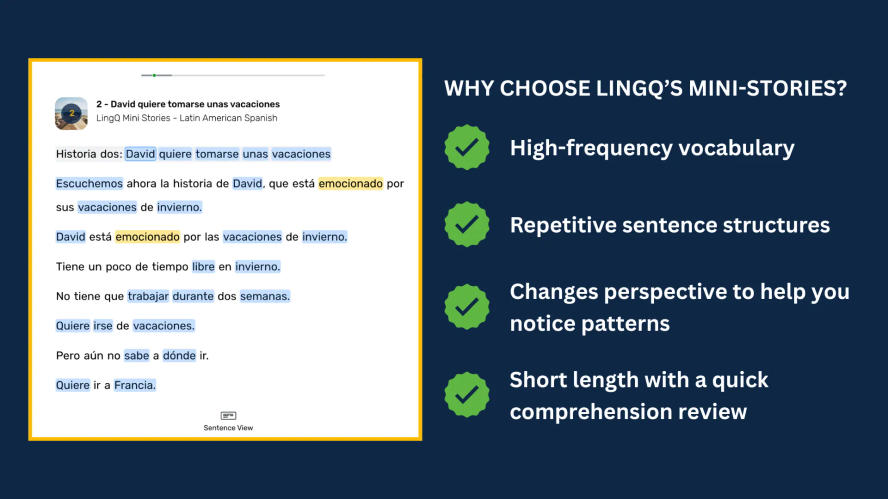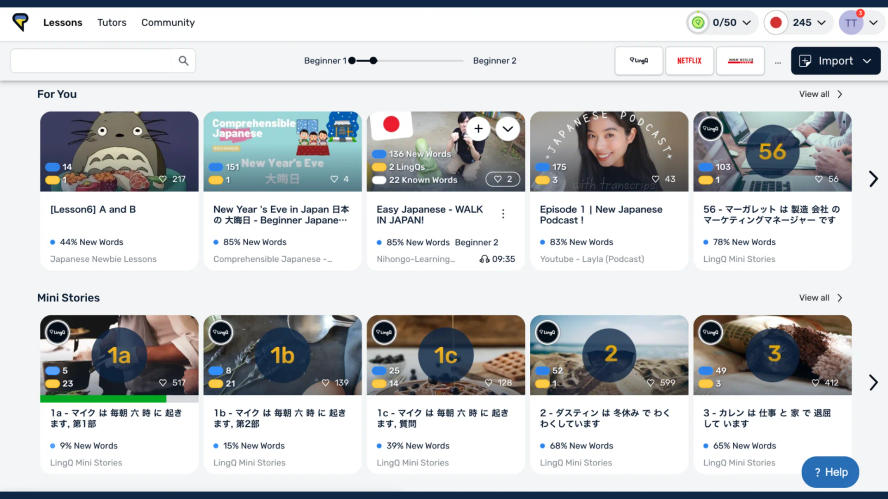TL;DR Summary
When we learn a second language, we move through stages that reflect our growing familiarity with it — not a fixed timeline.
First, we connect with the sounds and rhythms of the language. This is where listening and reading — not memorizing — build the foundation. Then, as we get comfortable, we start to notice patterns, explore more complex material, and experiment with speaking. Finally, with enough exposure, we reach autonomy — the point where we can live in the language naturally.
It all comes down to time with the language, curiosity, and enjoyment. The more we immerse ourselves, the faster fluency takes root.
***
What does the process of language acquisition look like? Of course, there’s no single answer. Language learning is an individual endeavor. However, I’ve summed up the language learning process in three broad stages.
I’ve previously talked about how long it takes to learn a language. In this post, let’s take a closer look at the stages of language acquisition. We’re not defining these stages by what you can produce (simple sentences, longer discussions, etc.), but rather how you can interact with the language.
So let’s break down the three stages.
What is Language Acquisition?
Language acquisition isn’t about memorizing rules or drilling grammar. It’s about getting used to the language, Through listening, reading, and noticing, the language’s patterns sink in over time. The brain starts to recognize sounds, words, and structures through exposure, not explanation.
As you encounter the same phrases in different contexts, they become familiar, and gradually you begin to notice how the language works. That’s how we acquire language — through meaningful input and repeated exposure, not through sheer memorization and explicit explanation.
Stage 1: Connecting with the Language (3–6 months)
Overall Goal: Develop a sense of familiarity with the language
Measurable Goal: Recognize 1000 words
Main Tasks: Lots of reading and listening to short, beginner-friendly content
The first stage is what I call connecting with the language. This is all about initial exposure. During this stage, you should be getting lots of listening and lots of reading. The content you’re using is simple and repetitive. If you’re studying for about an hour a day, this stage typically lasts between 3-6 months.
When I was starting Persian, for example, I spent hours with simple, repetitive stories. I didn’t worry about grammar explanations or producing much. I just listened and read again and again. My priority was to gain familiarity with the sounds, patterns, most basic structures, etc.
LingQ’s mini stories are especially useful during this stage of language acquisition. The stories use the most common verbs, connectors, and everyday phrases, over and over again. You gradually start to understand the structure of the language naturally, and high-frequency vocabulary will start to cement.

Stage 2: Getting Comfortable (6 months)
Overall Goal: Pursue more challenging learning content and start to emphasize speaking
Measurable Goal: Understand 90% of most texts and conversations
Main tasks: Connect your reading and listening to your personal interests and meet with a tutor more frequently.
After that comes the second stage: getting comfortable with the language. Here, you’re no longer a total beginner. You’ve built up some comprehension, and now it’s time to push yourself.
This stage is about working with more challenging content and adding more variety to your learning. You’re not quite ready for full-blown authentic material, but you can start moving in that direction. Non-fiction books, podcasts, and conversations about themes that interest you — history, politics, economics — are excellent choices.
LingQ is especially helpful when pushing yourself towards more challenging texts. The ability to listen and read simultaneously enhances your immersion. Instantly looking up and saving new vocabulary makes the process less cumbersome. You can challenge yourself, but still enjoy the process.

Browse and customize your language library on LingQ. Find podcasts, books, and YouTube channels you’ll love. Import your own favorite content to keep the motivation high.
It’s also at this stage that speaking begins to feel more natural. You’ve acquired enough vocabulary to comprehend the language well enough and maintain interesting conversations. You’ll find it beneficial to meet with a tutor more frequently and become a more active user of the language.
Stage 3: Full Autonomy (Indefinite)
Overall Goal: Enjoy the language, refine communication skills
Measurable Goal: The majority of content I consume is for native speakers, and I understand more than 90% of it
Main tasks: Interact with the language as a native speaker would
Finally, you’ve reached a stage in which you can read and listen to just about anything you want. You’re engaging with authentic material — novels, news, podcasts, films. You’re enjoying the language the way that a native speaker would.
This is also the stage where many learners become more curious about grammar. Early on, grammar explanations are often intimidating and abstract. But now, with a base of experience in the language, grammar becomes interesting. You notice more complex patterns and aim to refine how you express yourself.
At this stage, if I had the time, I’d focus more on grammar—using books and audiobooks meant for native speakers—since I now understand enough to benefit from them. But my interests usually lead me toward history and literature, which I find both enjoyable and effective for maintaining and improving my languages.
If I needed to take a proficiency test, this would be the time, as my reading, listening, and vocabulary would already be strong. It’s also the ideal moment to refine specific skills like presentations, writing, or business communication by imitating native materials and working with a tutor when needed.
Stage 3 is also the right time to think about immersion in the country itself. By now, you can take full advantage of being surrounded by the language, instead of being overwhelmed by it.
But it’s important to remember: this stage has no finish line. Language learning is a lifelong journey. You continue to build vocabulary, refine pronunciation, and deepen your understanding as long as you stay engaged.
Final Thoughts
So there you have it:
- Stage 1: Connect with the language through simple, repetitive input.
- Stage 2: Get comfortable by pushing into more challenging material and increasing interaction with native speakers.
- Stage 3: Enjoy the language independently with authentic content and consider full immersion.
I reiterate that language learning is an individual process. Certain stages may take more or less time depending on your consistency, motivation, and previous experience with languages. Regardless, the overall process remains the same: let the language come into you, focus on comprehension, and fluency will follow.
Language learning isn’t about how quickly you can produce a few set phrases. It’s about building a deep connection with the language — and that’s a process you can enjoy indefinitely.
_____________________
FAQs
How long does it take to learn a new language?
This depends on the language and your habits. In general, I typically need about one year to reach Stage 3. For more distant languages, such as Arabic or Chinese, this could take longer.
Should I focus on speaking from the beginning?
I wouldn’t. Early on, it’s better to focus on listening and reading. Speaking becomes easier once you’ve built up some comprehension skills.
When should I start learning grammar in depth?
While you can glance at grammar early, it usually makes more sense — and is more enjoyable — once you’ve built a base of experience in the language. Personally, I don’t ever prioritize grammar as a learner. It’s more of a reference.
Do I need to live in the country to learn a language well?
No, especially not at the beginning. Immersion in the country is most useful once you’re already comfortable with the language.
What resources are best for beginners?
Repetitive, simple content like LingQ’s mini stories, short podcasts, or graded readers. As you progress, aim for more authentic, challenging material.









4 comments on “3 Stages of Second Language Acquisition”
Comments are closed.
Hi Steven.
How do long take it per hour. You would to tell your day to day. For example: you wawake up, then eat apples, on one hour listen to mini story etc. Thank you.
Thank you so much ! Very interresting !
But at what stage can we begin an another language and when begening a new one do we only learn the new one for a few months without practicing the other(s) ?
Thank you! Best regards
Claire
Hi Steve, I want to sign up for and pay for Linq to learn Spanish. However, I already signed up for a free lesson in Russian. Now I cannot get away from the Russian lessons to learn Spanish. Can you tell me what to do?
Chalia